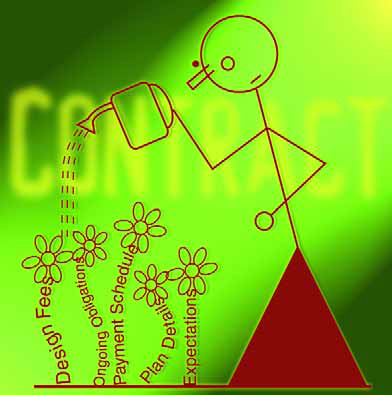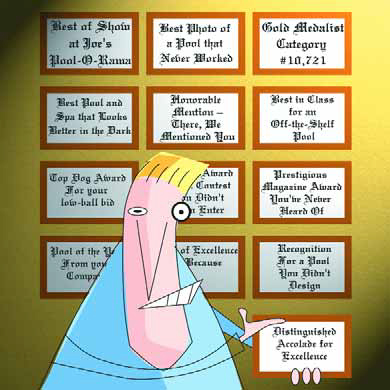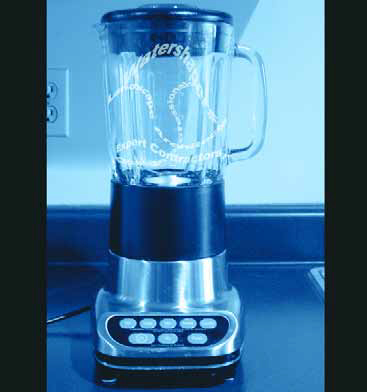Professional Watershaping
As the fields of landscape architecture and watershaping intermingle, the knowledge bases for each trade increasingly need to be shared across various design, engineering and construction disciplines. That sharing, unfortunately, has been relatively slow to develop, which means that, as a designer and builder and of custom high-end watershape and landscape projects, I am often frustrated by the lack of detail I find in plans and specifications generated on all levels of the trade. Although this deficiency flows freely from all sectors, the most frequent sources of inadequacy in watershape plans are landscape architects and designers, too many of whom offer information that is disturbingly vague and thoroughly lacking in detail. We've all seen the blue patch on the overhead plan view - a grossly inadequate delineation of a significant design component if ever there was one. Contractors presented with such documentation are left to define specific details themselves and essentially are asked to build some version of that blue patch as they
Please forgive me as I revisit themes from a couple of my past columns. One was written earlier this year on why we do what we do, while the other was published several years ago - back when I first began writing for WaterShapes - and was all about a subject dear to my heart: roses. Recent events in my family have given me time and the need to sort through the past, and the experience has deepened my appreciation of gardens, their emotional power and how they come to reflect our clients and ourselves. I'd like to share this process of discovery to define what I see as the essence of what we all try to do as professionals - and encourage all of you to
Value is measured and determined in a variety of ways. When it comes to pools and spas, for example, I'd say that the straight-dollar value is only one of several yardsticks and that, for many clients, it's no longer the one that tops their lists. Instead, beauty, health benefits, artistic merit, pride of ownership and emotional appeal are more important than price tag for many of them - a wonderful trend, to my way of thinking. These measures of value, of course, are highly subjective. Every client is a little bit different, and the relative value of non-monetary factors can be
Almost everyone I've talked to recently is busier than ever these days. And it's across the boards, from landscape architects and designers to pool and spa builders and subcontractors of every type: Everyone is swamped, and this year in particular they all seem to be having trouble just keeping up. The odd thing is that nobody I've spoken with has an entirely clear idea why this year is so busy. At best, the economy is mixed: oil and gas prices are through the roof, the stock market has been extremely inconsistent and consumer confidence has been shaky. Yet watershaping projects just seem to keep on rolling, no matter the news. One undeniable factor seems to be driving this demand - that is, the
It'd be great if we all lived in a world where a handshake was sufficient to seal a deal and no legal documents were needed. Unfortunately, however, we live in a society in which contracts are a necessity for most of us in business. When I first started out, I took on jobs without signed contracts, and for the first few years I didn't run into any problems. As I moved into higher-dollar projects, however, I developed a quick appreciation for the value of a contract when a client refused to pay for my services as we'd verbally agreed he would. Although I realize there are people out there who run strong, successful businesses without a need for contracts and rarely run into problems, for most of us I believe it is a critical component of every job. The purpose of any contract is to
Most people I know enjoy being recognized for a job well done. From a simple pat on the back to the Nobel Prize, we get a sense of affirmation when our best efforts are seen and appreciated. Yes, there are those who see the work as its own reward. For most of us, however, recognition is a good thing, whether you prefer the warm-and-fuzzy side of being singled out for public praise or see the business advantage that comes along with recognition. Whether you're a film star brandishing an Oscar or a swimming pool contractor with an armload of design awards, there's an enhanced marketability that accrues to those with trophies on shelves and plaques on walls. For years, the pool/spa industry has
Most of us are in business to earn a living, which is probably why so many of us think of the high-end market as the place to be. In general, of course, the bigger the job, the larger the paycheck will be. But when I look more closely at the work I've done through my career, I believe we might be overlooking valuable opportunities for personal and professional growth by being so single-minded in pursuing grand, big-ticket jobs. When I started my business 15 years ago, I was happy to find work on small borders in small spaces. Since then, I'm proud of the fact that I have worked my way up to designing for multiple-acre estates. To be sure, I much prefer having a few large jobs to a bunch of smaller ones, but
I was all set to write a column about the virtues of small jobs compared to big jobs, but I've had an experience that leads me to share something more important with you this time. Most of us have had these moments in our lives in which we are suddenly jarred into evaluating our existence for one reason or another - episodes that give us reason to pause and reflect on who we are and what we're doing and why we're doing it. As I write this, I'm dealing with an illness in my family that has quite literally knocked the legs out from under me. As I've spent time these past few days talking with friends and relatives, I've found myself quite often laying on the living-room couch and staring out the window into my backyard - and finding
Reader Chris Walton asked a great question in response to comments I've made in a couple of recent columns about the value of detailed plans: "Why do we in the pool industry lump sales, design and project assessment into one job description?" In the message surrounding his question, he explained in some detail that his firm, PoolDizine, Inc., of Jacksonville, Fla., takes basic plans and proposals for swimming pools and other watershapes and turns them into complete and extremely detailed sets of construction documents and plan drawings that can be used in generating accurate bids and that also provide detailed specifications for the construction process. To be sure, he has an interest in altering






















